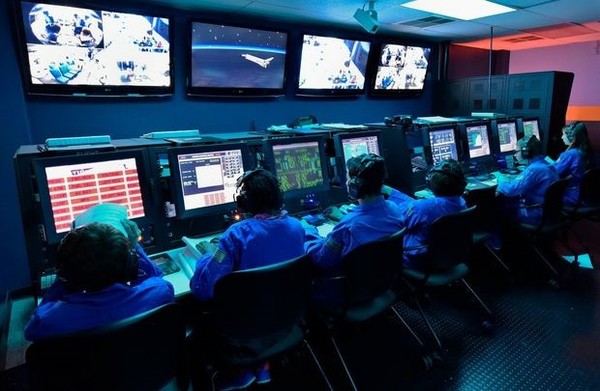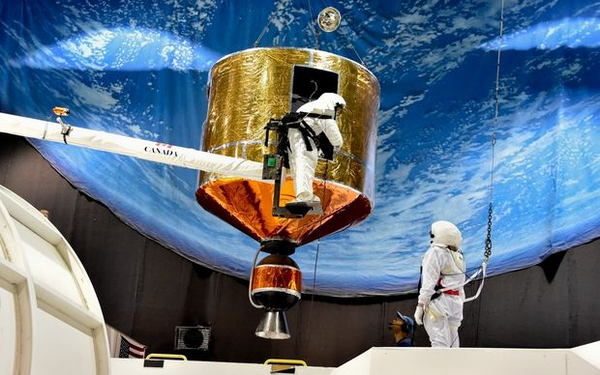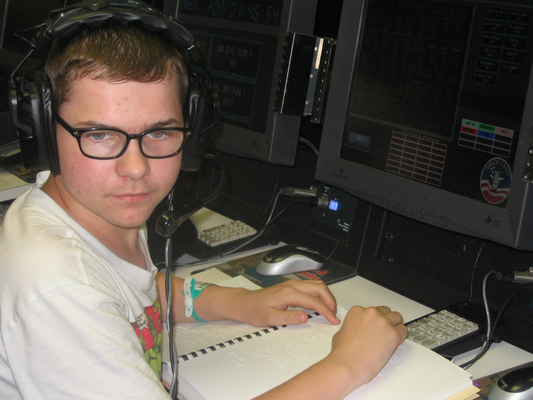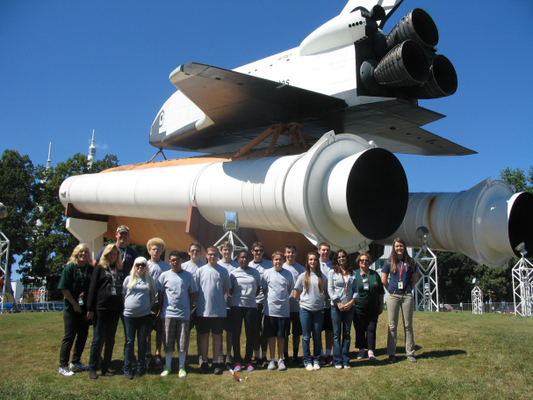Thomas Cowley is a Year 12 student at Cranbourne Secondary College. He has written the following article about a fantastic opportunity he shared with five other Victorian students two years ago.
Just Because I Can’t See the Stars, Doesn’t Mean I Can’t Reach For Them
Thomas Cowley
In September 2014, I had a once-in-a-lifetime opportunity to attend NASA space camp at the US Space and Rocket Center in Huntsville, Alabama.
Every year, a week of this amazing camp gets set up especially for blind and low vision students like myself from all over the world, to challenge the myth that vision impaired people cannot pursue a career in science.
In 2014, 202 students, representing eleven countries and 24 US states attended, a record in SCIVIS (Space Camp for Interested Visually Impaired Students) history.
While at space camp, we were all put in groups with whom we would complete all of the week’s various activities. I was in team Holderer, which’s namesake, Oscar Holderer, was an aeronautical engineer who worked alongside Wernher von Braun on the Apollo Space Program at Marshall Space Flight Center. Our group comprised five Aussies and seven Americans – and as at time of writing we’re still in contact.
While at the Space and Rocket Center, we participated in a number of activities, workshops and lectures on a wide gamut of subjects, including the history of the shuttle program and space exploration, shuttle engineering, space medicine, mission control, spacecraft operation, extravehicular activity, the International Space Station and team work.
We were able to experience the 1/6 chair (a moon walk simulator), the MAT (multi axis trainer-a unit used to simulate an out-of-control space shuttle), and neutral buoyancy (essentially microgravity) or the MMU (man maneuvering unit-a jetpack simulator). As well as these fun and illuminating simulations, each team completed four simulated missions – three 1 hour missions and one 3 hour mission each – in which we each fulfilled different rolls relating to the mission.
A large focus of the programme was team work. Every activity that we did could be used and analysed to learn something about working alongside others. As well as abstracting lessons learned in the course of space activities, we also did activities specifically targeted at teamwork, such as: the low elements – an island-to-island commute where you’re held up by your teammates’ bodyweight); an assisted rock-climb and vertical descent; a zip-line; and pamperpole – a 37FT pole off of which you jump, held aloft by your teammates.
Continued on page 20
The program was not only based on teamwork or missions. In addition to these, we dived in to the science behind space travel and associated technologies through hands-on activities in which we had the opportunity to build power cells, heat shields, water purifiers and rockets (which we were able to launch).
Throughout the entire week, we were marked on all of our work.
The opportunity to go to Space Camp was an extraordinary boon in my interpersonal and intrapersonal development, and one that I will not forget in a hurry. Even if I can’t remember all of the experiences with vivid clarity any more, the lessons learned, about teamwork, about perseverance, and about never letting obstacles never get in your way, will stick with me for a lifetime.
It is only because of the huge generosity of everyone around me – friends, family, school and the community – that I was able to go to Space Camp and enjoy the experience of a lifetime. Across two years, I again wish to thank everybody who helped us to get to Space Camp, everybody who ran the camp, and everybody who gave me support when I needed it.
The feeling of walking up to accept my graduation packet is one that will stick with me forever, and it is thanks to the skill, generosity and kindness of no shortage of people that me and five other Victorian students were able to experience that thrill.









